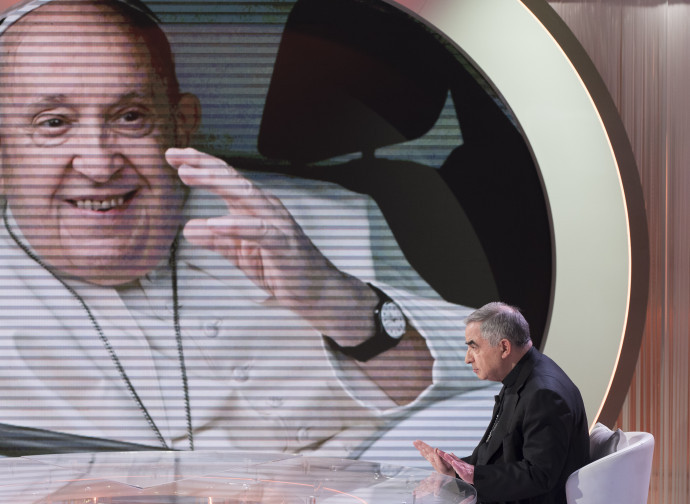Dramatic clash between cardinals: Becciu excluded from conclave
After a 'fiery' Congregation, Cardinal Becciu takes a step back and withdraws from the upcoming conclave. Two documents have been unearthed to sideline the Cardinal, but new details about the accusations are emerging, adding to the mystery. The conclave begins on 7 May.

Daggers were out during the fifth meeting. Finally, the two documents of the Pope to sideline Cardinal Angelo Becciu have come to light. There had been much talk in recent days of two letters signed 'F', but it was only yesterday that it was confirmed to all the cardinals that that the Pope had put his decision in writing. Some papers were shown to the Congregation yesterday, but it cannot be said with certainty that they are the same ones mentioned, as no one has ever seen them before, least of all the person concerned.
No luck for the former Substitute for General Affairs, who, at 76, would have had the right to enter the conclave. Since the meetings began the day after Francis' death, the dilemma of Becciu yes or Becciu no has dominated the proceedings. As combative as ever, he continued to assert his right until yesterday. He was opposed by Cardinal Kevin Joseph Farrell, chamberlain and former roommate of Theodore Edgar McCarrick, who was stripped of his cardinalate for sexual abuse. The Sardinian cardinal, on the other hand, is paying for his conviction for embezzlement in the first instance by the Vatican court, in a trial that is becoming more and more mysterious as time goes on.
Only yesterday, the Italian newspapers Domani and Il Tempo revealed the existence of audio recordings and chats that would show the central role of Francesca Immacolata Chaouqui in Monsignor Alberto Perlasca's decision to point the finger at his former superior. Without Perlasca's memoirs, Becciu would not have ended up under investigation and probably would not have lost his right to vote in the conclave. But there were those within the Sacred College who would not listen to reason and wanted him expelled at all costs, citing the need not to betray the wishes of the late Pope.
In doing so, however, they did a disservice to the memory of Francis, who would have liked to go down in history as the Pope of mercy, and who will instead be remembered for having deprived a cardinal of a right deriving from his office, on the basis of a first instance conviction, and for acts that were certainly not as serious as those committed by McCarrick, for example.
Who was afraid of the former substitute? The more his case progressed in the Congregations, the more it became clear to his confreres that he was the victim of injustice. In the end, he himself relieved everyone by deciding not to pursue his claims and by acknowledging the content of the two papal documents. This gesture aroused the silent admiration of the other members of the College, especially the foreigners, who were poorly informed about the many shadows that surrounded the investigation against him. It is difficult to go on like this for several more days while the profile of the next Pope and the desired guidelines for his action are being outlined.
It is particularly difficult in the light of the revelation of the two papal documents that have not yet been confirmed, although the case has been discussed for some time.
Yesterday morning's meeting also set 7 May as the date for the start of the conclave. This is a small defeat for the most ardent supporters of Bergoglio, who would have preferred to start on 5 May and try to elect either Parolin or Aveline without giving the cardinals more time to get to know each other. We are in for some intense days in the Congregations, but the excluded Cardinal will be able to participate. His voice will be heard and he could denounce the unscrupulous use of the law that has been the norm for the last twelve years and the complicity of some papabili in the mistakes of the late Pope.
